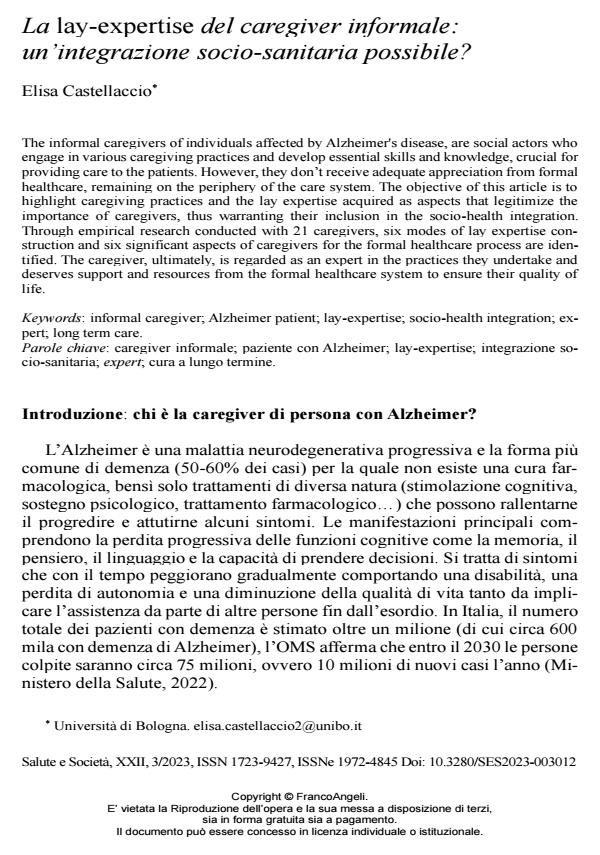La lay-expertise del caregiver informale: un’integrazione socio-sanitaria possibile?
Titolo Rivista SALUTE E SOCIETÀ
Autori/Curatori Elisa Castellaccio
Anno di pubblicazione 2023 Fascicolo 2023/3
Lingua Italiano Numero pagine 13 P. 164-176 Dimensione file 436 KB
DOI 10.3280/SES2023-003012
Il DOI è il codice a barre della proprietà intellettuale: per saperne di più
clicca qui
Qui sotto puoi vedere in anteprima la prima pagina di questo articolo.
Se questo articolo ti interessa, lo puoi acquistare (e scaricare in formato pdf) seguendo le facili indicazioni per acquistare il download credit. Acquista Download Credits per scaricare questo Articolo in formato PDF

FrancoAngeli è membro della Publishers International Linking Association, Inc (PILA), associazione indipendente e non profit per facilitare (attraverso i servizi tecnologici implementati da CrossRef.org) l’accesso degli studiosi ai contenuti digitali nelle pubblicazioni professionali e scientifiche.
The informal caregivers of individuals affected by Alzheimer's disease, are social actors who engage in various caregiving practices and develop essential skills and knowledge, crucial for providing care to the patients. However, they don’t receive adequate appreciation from formal healthcare, remaining on the periphery of the care system. The objective of this article is to highlight caregiving practices and the lay expertise acquired as aspects that legitimize the im-portance of caregivers, thus warranting their inclusion in the socio-health integration. Through empirical research conducted with 21 caregivers, six modes of lay expertise construction and six significant aspects of caregivers for the formal healthcare process are identified. The care-giver, ultimately, is regarded as an expert in the practices they undertake and deserves support and resources from the formal healthcare system to ensure their quality of life.
Parole chiave:caregiver informale; paziente con Alzheimer; lay-expertise; integrazione socio-sanitaria; expert; cura a lungo termine.
Elisa Castellaccio, La lay-expertise del caregiver informale: un’integrazione socio-sanitaria possibile? in "SALUTE E SOCIETÀ" 3/2023, pp 164-176, DOI: 10.3280/SES2023-003012